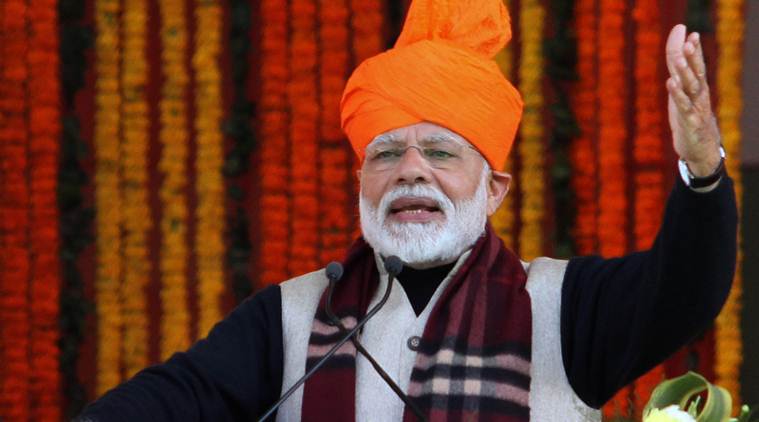Updated: February 11, 2019 12:32:00 am
View from the neighbourhood: Kashmir Again
The editorial in Dawn took a dig at PM Modi’s behaviour in front of the cameras: “Mr Modi was ultimately spotted waving emptily at imaginary crowds as he took a safe cruise through the famous Dal Lake.”

The images of Prime Minister Narendra Modi in Kashmir and Ladakh at the beginning of the week were used by Dawn in its February 5 editorial to tear into the Indian state’s “atrocities” in Kashmir: “The land was on a lockdown to ensure smooth passage for the Indian prime minister, who was visiting to monitor development projects. Businesses were closed and internet services on the phone suspended. True to tradition, several well-known Kashmiri leaders were put under house arrest and hundreds of others also taken into custody in the run-up to the trip. Srinagar presented the look of a city besieged by soldiers taking control of the roads.”
The editorial also took a dig at PM Modi’s behaviour in front of the cameras: “Mr Modi was ultimately spotted waving emptily at imaginary crowds as he took a safe cruise through the famous Dal Lake.”
The editorial then moves on to criticising the BJP’s “hawkish” positions on Kashmir: “And if the frustration of the administration is reflected in the large number of civilian casualties in recent times, the fear is that with a general election looming in India, the ruling party will be seeking to play up its Hindutva philosophy all the more vociferously to get votes.” The editorial hopes that the many “saner” voices in the Subcontinent triumph.
Dhaka alone
The February 8 editorial in the Daily Star echoes a lament that has been persistent both from the establishment in Dhaka as well as the media: “It’s been nearly two years since more than seven lakh Rohingya people have entered Bangladesh having fled violent crackdown in Myanmar. There’s no viable solution in sight. As Myanmar continues to procrastinate when it comes to the repatriation, signs on the ground suggest a dismal prospect: the Rohingya crisis is deepening. Hundreds of thousands of refugees are currently sheltered in several vast camps, spanning several Upazillas in Cox’s Bazar. Their lack of access to education, income-generating activities and recreation is affecting them psychologically. On the other hand, having so many refugees in a relatively small area has created societal tensions and hurt the local environment. Bangladesh, therefore, is reluctant to pursue programmes that may act as pull factors.”
The thrust of the chagrin in Bangladesh appears to be around the perception that it is alone in bearing the brunt of the crisis precipitating from Myanmar. “The world’s reluctance to take stringent measures against those responsible for the genocidal crackdown allows Myanmar’s military to act with impunity. Its new crackdown targeting other ethnic groups has already prompted new exodus of Buddhist community to Bangladesh. UN must engage with Myanmar’s closest allies to persuade it to shun violence and take back its citizens,” it concludes.
Afghan questions
The perception that the United States under Donald Trump is ready to withdraw from Afghanistan, following the meeting of US representatives and those from the Taliban in Doha, is causing a lot of comment in the strategic circles in Pakistan. Syed Akhtar Ali Shah writes in The Express Tribune on February 7 that “Until the issue of foreign forces was agreed upon, the progress on other issues would be impossible, he quipped. From his statement it appears that their major focus is to ensure withdrawal of foreign forces within the specific timeline. Achievement on that score will be a strategic victory. Once such a goal is achieved the future course of things will shape the way as they want things to be. The other important clause in the draft is that Baloch militants would not be allowed to use Afghan soil to target Pakistan, a consoling point for Pakistan. The plans about the interim future set-up and its composition is ambiguous; it is also not clear whether the Taliban would register as a political party and participate in elections or not.”
While peace in conflict-torn Afghanistan is something all would welcome, there are questions on the contours of a peace which gives control back to the Taliban: “The question is: peace at what cost? Will the Taliban and other violent non-state actors lay down their arms; abide by the constitution and law of the land? Will the ultimate use of force be with the Afghan National Security Force? Will it be at the cost of human rights? The fundamental question remains what will be the shape of society with the emergence of Taliban as dominant force in the future set-up of Afghanistan? If such questions are not answered clearly and left to ambiguity, the results may be what we witnessed in Swat and Waziristan in the past.”









.png)




























No hay comentarios:
Publicar un comentario